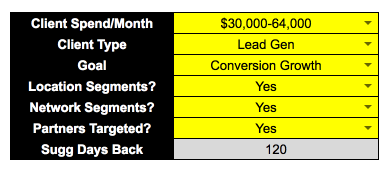August 10, 2017
So, you got an account to audit. Where do you begin? There are a lot of details to research and discover in an Adwords account alone that you need to dive into to help the client reach their goals. But how do we get to the point where we have our laundry list of suggestions?
Step 1: Ask the current manager of the account the right questions
Current Manager of Account: Can you audit my account for me?
Your Team: Sure, can you give us some insights & details on what you need?
Current Manager of Account: You’re the expert, you should tell me what I need.
Well, she/he could have been nicer about it, but they aren’t wrong. You’re in charge of bringing the ideas to the table, but that doesn’t mean you shouldn’t ask questions going in. At the very least the following should be relayed your way before starting the audit:
- What’s your typical monthly budget?
- What is the end goal from your advertising efforts as a whole (lead gen or direct sales)?
- Directionally what needs to improve the most (more leads, more revenue, better CPL, better ROAS)?
- Do you target different location segments differently?
- Do you advertise on multiple networks (Search, Display, Shopping)?
- Do you target Search Partners?
These are just a select few of the questions that can be answered very easily by a person who has been in the account – and it can save you time in terms of next steps off of these questions.
Step 2: Develop the team for the Audit
Once you have all your questions answered up front – develop the team based on that information for the audit. Things to consider when developing the team include:
- Team Members Capacity
Make sure this is looked at to assure the rightful amount of time is put into the audit in order to bring quality work back to the account.
- Balancing the Roster
In terms of the team put in charge of the account audit – be sure to have a great balance across the team in terms of their strengths, weaknesses, experiences, amount of experience, etc. Always keeping a balanced roster across different projects in terms of skill sets helps to not only make your team stronger as they learn from each other – but makes your work stronger as different mindsets come together to solve problems on the account.
- Aligning Team Strengths
As you balance the roster – you’ll also want to be sure you align your team strengths to how the previous account manager answered the initial questions. Make the team somewhat eCommerce experienced heavy if the account is eCommerce. Bring in leaders on expansion and different platforms if the goal is to grow the lead or revenue volume. Assure that your teams strengths align with the needed strengths on an account to make sure for a great audit.
Step 3: Decide What Reports Will Be Needed
Diving into an account with a mission in mind is much easier than diving in without a clear goal. This is why the upfront questions are extremely important. From there – you’re able to decide what reports would be most useful based on the account needs. Below shows a shorter example of what this might look like in terms of alignment:

The details behind what reports we would run come from some of the answers we received in Step 1 as seen here:

The point here is to connect the dots from each step – and assure that the work being put in on the audit is not only quality work, but usable work as we move onto the fourth and final stage.
Step 4: Complete Analysis & Suggestions
The final step in the process is to take the reports pulled, along with other account findings performed based on the account details given – and create a deck that provides guidelines and next steps based on the findings.
Aligning the data from the reports to what is currently in place in the account compared to what the data shows should be in the account is where everything comes together.
Conclusion
The perfect, simple example of how the process works on a small scale:
- You’ve been told the audit is on a Lead Gen account that needs to improve CPLs
- You put together a team with an experienced leader on Lead Gen accounts, a top bid/budget management team member and a fresh mind who has less experience but is extremely sharp at the numbers game
- You run reports that align with the situation & use metrics that also align (ie: Device Analysis, Time of Day Heat Maps, Geo Analysis, KW Level Bidding process analysis, etc. with Conversion Rate and CPL metrics in mind in terms of the performance side)
- Your team then completes the reports and develops an analysis on what bid adjustments to make and what other adjustments can be made based on the reports and other findings given the situation
Seems simple enough, yeah? These 4 steps are crucial for audits to go smoothly and assure:
- No time wasted on unrelated analyses
- Quality work from a balanced team
- Everyone across the board is on the same page